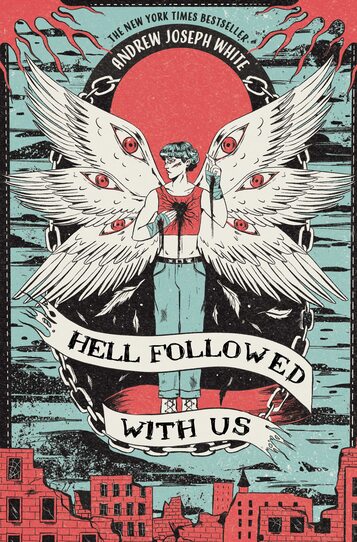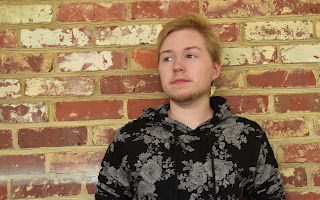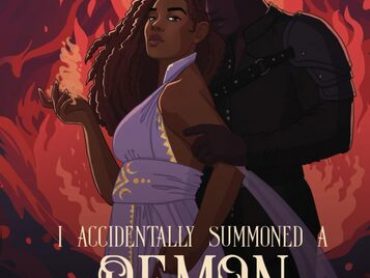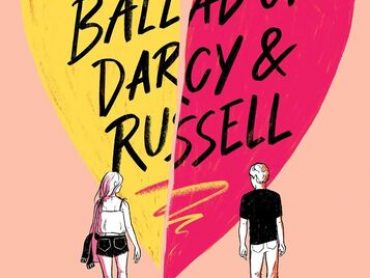Andrew Joseph White is the author of Hell Followed with Us. Hell Followed with Us follows Sixteen-year-old trans boy Benji who is on the run from the cult that raised him. The book explores trans kids with claws and fangs, and what happens when they bite back. Andrew was able to speak with YEM about how his fascination for monsters started, the best part about writing for a young adult audience, and what writing this debut novel taught him about writing.
Young Entertainment Mag: How do you feel about having your book Hell Followed with Us out for everyone to read?
Andrew Joseph White: More than anything, lucky. I can’t believe it’s been over half a year since it released, and I got to put a horror novel about messed-up queer kids trying to save the world onto shelves. Growing up, I was lucky to find a single book about trans people—now, I get to be a part of the community bringing all kinds of stories to all kinds of queer folks. The number of readers who’ve told me this book was meaningful to them is mind-blowing, and I’m thankful for every single one.
YEM: What can you tell us about your book?
Andrew: Hell Followed with Us is a YA post-apocalyptic horror novel about a trans boy, Benji, who escapes from a doomsday cult, joins a rebel group of queer teens, and turns into a giant monster. It’s also about religious trauma, dysphoria, queer community, and the dangers of American conservatism and fundamentalism. The book is rough, and bloody, and brutal, and the exact kind of book I needed to read as a kid. As always, if you haven’t read it yet, please check the content warnings!
YEM: How much does it mean to you to have a book where you are able to bring representation to the trans community?
Andrew: As I mentioned above, the reader feedback has been almost overwhelming—and I couldn’t be more grateful. I’ve had young trans teens almost cry when meeting me. Every time, every time, I feel it just as strongly. I’m grateful to be part of this new wave of trans writers telling their stories and bringing our experiences into the public sphere. I’m definitely not the first, and I’m sure as hell not the last, and if that’s beautiful I don’t know what is.
YEM: You also write about monsters, and you have a love for them, how did this fascination for monsters start?
Andrew: Oh, I love talking about this! I’ve always loved monsters, even when I was really little. I always identified more with them than with other characters, like people or animals. These days, I’m able to look back and recognize why: I didn’t have the words for being transgender or autistic, and those things made it difficult for me to connect with both myself and others. Monsters were the only place I ever really saw that reflected. Even though I’ve come to realize who I am and can embrace it, monsters and monstrosity still make up a large part of who I am. I love writing about monsters and giving them the happy endings they deserve!
YEM: Do you like to draw inspiration for your books from your life often?
Andrew: As a trans and disabled horror author, it’s hard not to. A lot of my work centers the body, gender, transphobia and ableism, and societal issues. I find that when you dig down deep into your own experience, your horror becomes much richer, much clearer, much more resonant with others. I’m working on stories based on my relationship with womanhood, another about my family home in West Virginia, and another about the self-dehumanization I struggled with as a child. I have a lot of inspiration to draw from! (I also joke that I’m incapable of processing events in my life without writing about them—do my books draw inspiration from my life, or is my writing how I sort through my life in the first place? We may never know.)
YEM: When did you first realize you wanted to be an author?
Andrew: I wrote my first story before I could actually form letters, and eventually wrote my first novel at eleven years old, so it was always a given that my life was going to be about writing. I spent my life dead set on putting a book in bookstores. Sure, I bounced around, said that I wanted a lot of different jobs—veterinarian, marine biologist, herpetologist, and in high school I even considered mortuary work and locksmithing—but when I went to college for creative writing, I finally knew I had the guts, drive, and ability to make it a career. It’s humbling to realize that you’re the culmination of your own childhood dreams!
YEM: What is your writing process like?
Andrew: When I was writing Hell Followed with Us, I didn’t have much of a process at all; I didn’t plan, didn’t think very far ahead, just wrote what came to me on the fly. The editing process that resulted from that, however, broke me of that habit very quickly. These days, my process is relatively structured. I start off with lots of brainstorming—I make “meaning maps” to ensure that all the symbols/themes/metaphors fit neatly into what I’m trying to say, I write a four to five-page outline with general story beats, and only then do I let myself start writing a first draft. During the first draft, I often keep a running list of things I need to fix, so that when I start over to clean up the mess, I know exactly what I’m looking for.
YEM: What is the best part about writing for a young adult audience?
Andrew: The best part has to be getting to write stories for kids like the one I was. My young adult novels are love letters to my teenage self, especially since I grew up during a time where queer lit was extremely rare in general, let alone in your high school library. (I graduated high school in 2016, and by that point, I had managed to locate and read exactly one.) It’s amazing to bring to kids and teens the sort of stuff I missed in my own childhood.
YEM: Has writing this debut novel taught you a lot about writing for your future novels?
Andrew: Absolutely—for the love of god, Andrew, plan. I mention above that Hell Followed with Us’s first draft was written without planning, and it made the editing process absolutely mind-numbing. I wrote that awful first draft from August to October 2018, and after that, I restarted it at least seven times in an attempt to fix it. Some of my attempts to fix it made it even worse than the previous version! I have plotted each of my stories out very carefully ever since. Plus, once the book sold, I got to experience my first professional editorial process—I learned a lot about structure, voice, and clarity.
YEM: What are three words that you have to describe Hell Followed with Us?
Andrew: Angry, queer, and blasphemous!
YEM: What do you hope your readers take away from your novel?
Andrew: Anger is not a bad thing—sometimes, anger is the emotion that tells you when you are facing injustice, and the emotion that pushes you to fight for something better. There’s a reason queer people are so angry, and I understand, I get it. Me too. I hope my readers understand that there is nothing inherently bad about anger, that fighting back is possible, and your survival is worth it.
YEM: What do you have in your future in terms of writing?
Andrew: I’m very excited to be able to announce that my next YA novel, The Spirit Bares Its Teeth, is coming out Fall 2023, and then I have another, Compound Fracture, coming in 2024! They’re both trans-led, autistic-led novels about anger, society, violence, and fighting against an unjust world, except one is a Victorian gothic horror and the other is a thriller taking place in 2017 West Virginia. I promise, if you liked Hell Followed with Us, you’re gonna like these too!





